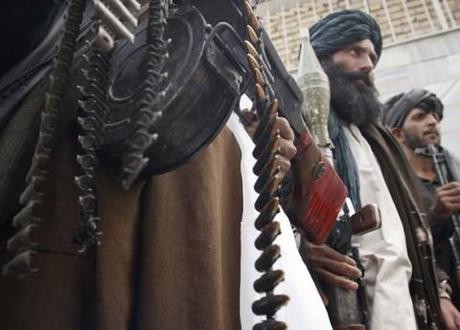
Former Taliban fighters. Photo credit: James
After 10 years of armed conflict with NATO troops, led by America, in Afghanistan, the Taliban may be ready to negotiate a peace: The militant Islamist insurgents announced Tuesday in a press statement that they would be opening an office in the Persian Gulf state of Qatar in an effort to facilitate talks with the US and the Afghan government.
The decision was warily welcomed by the Obama and Karzai administrations, but observers are questioning whether the Taliban, who ruled Afghanistan from 1996 until the US-led invasion in 2001, can be trusted, or even whether the whole of the loose-knit Afghan Taliban backs the decision. The move follows months of back-and-forth in attempted negotiations with the notoriously indistinct insurgency; but it is also the Taliban’s first public offer of talks that is not conditional on the withdrawal of US and NATO troops.
So, is this a step on the road to peace? Or just more smoke?
The Year of the Taliban? “No matter what the Chinese may say about 2012 being the year of the dragon, this is going to be the year of the Taliban so far as the United States is concerned,” declared MK Bhadrakumar, former Indian diplomat to Central Asia, at Asia Times. The Taliban office comes just in time: US President Barack Obama must prove progress in Afghanistan ahead of a NATO summit meeting in April, and, of course, ahead of the US presidential election in November. Meanwhile, Afghanistan’s neighbour, Pakistan, which has long sought to control the future of the country, and Russia, which also has long-term interests in the region, have both signaled to “Washington that its monopoly of conflict-resolution in Afghanistan has to end”; the US is dependent on both to keep supply lines to troops in Afghanistan open.
It’s good news. This office is a “breakthrough”, The Economist’s Banyan blog claimed, noting that the idea of peace negotiations with the Taliban “seemed dead” after the assassination of Afghan President Hamid Karzai’s leading peace envoy in September. There is a reasonable fear, however, that the talks will come to nothing: The US could push too far, too fast, the Taliban themselves are likely too fragmented to talk, and Karzai has in the past opposed the establishing of a Taliban office, out of “a fear of being marginalised and the need to keep his fragile non-Pashtun coalition together”. Even so, it’s an avenue worth pursuing: “Even if there is nothing really there yet, even a make-believe process can get a momentum of its own,” one analyst told The Economist. “If everyone acts like they believe it, it might become something.”
Does Mullah Omar speak for everyone? One of the biggest obstacles to peace negotiations, however, is the worry that the Taliban’s leadership, headed up by Mullah Mohammed Omar, doesn’t speak for all of the increasingly fragmented factions of the Islamist insurgency. The Christian Science Monitor noted that US military action has decimated the “mid-ranking commanders who moved between the groups of fighters within Afghanistan” and Mullah Omar’s inner circle;. “With Taliban leadership removed from the daily fighting, its ties to those suffering heavy losses on the frontlines, may well have frayed, weakening its authority.”
US denies doing detainees-for-office deal; where does that leave the Taliban? Claims that this office is the product of secret talks and agreements between the Taliban and Western officials abound, but the US on Wednesday denied agreeing to release Taliban officials from Guantanamo Bay in exchange for opening peace negotiations officially. Moreover, US officials claim that transferring anyone out of Guantanamo would be a highly complicated process. Said Julian Borger, at The Guardian’s Global Security blog, “In that case, it is an open question how long the Taliban will stick around in their new Qatar office with nothing to show for it.”
Can it work? Maybe. The odds are certainly stacked against a power-sharing settlement with the Taliban, Reuters’ Myra MacDonald noted: “[A] lasting settlement would require not just a deal with the Afghan Taliban led by Mullah Mohammed Omar, but also reconciliation among all the different actors inside Afghanistan as well as deep-rooted governance reform. It would need intensive regional diplomacy to prevent the country’s neighbours from undermining any settlement — whether this be driven by Pakistan’s unhappiness with Indian involvement in Afghanistan, or the temptation for Iran to queer the pitch as its row with the west over its nuclear programme worsens.” Add to this the increasingly frosty relations between the US and Pakistan, the worry that the US, weary of years of war, is looking for a “quick fix”, even the possibility of civil war in Afghanistan, and peace may be elusive.
More of Afghanistan
- Secret talks leaked, suspended
- Hamid Karzai’s brother killed
- Obama announces troop withdrawal
- Remember Afghanistan?

